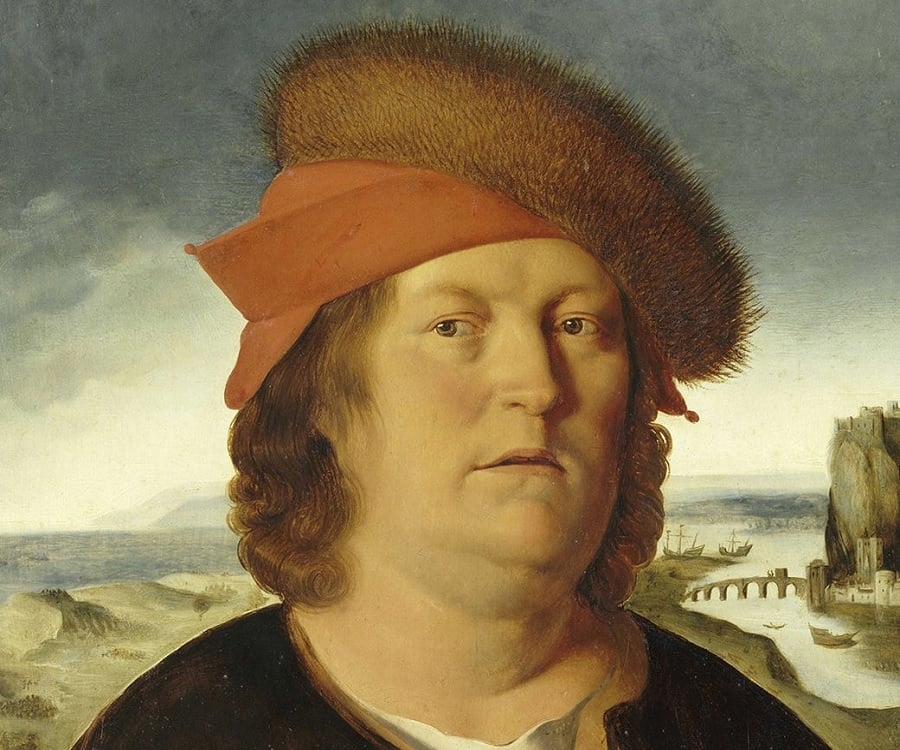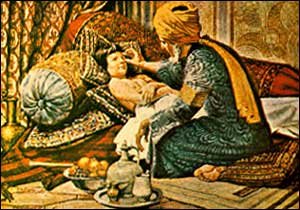The development of herbal medicine and its practice throughout the world has a strong history, with each country forming its own tradition of herbal pharmacy. This has become incorporated into its culture and what is unique to each tradition has developed through many years of knowledge, skill and practice. Some of the older traditions remain very much intact throughout history and herbal medicine here continues to be practised in a manner of their ancestors and passed on through generations of healers.
 |
| Paracelcus (1493-1541); Physician, Botanist, Astrologer |
Putting all this into context, it is important to start at the beginning and to examine the earliest records of how herbal medicine all began. Wild plants have been used for food and medicines long before records were kept. Medicinal and other uses were undoubtedly uncovered by trial and error, which may not have always been pleasant with probably some disastrous and tragic consequences for some. The plants explored would have been mainly native to the country at first before any ‘foreign’ species being cultivated in herb gardens specifically for the medicinal use (the basis for some of the commercial business now). Establishing when all this began is somewhat difficult since early documented evidence of medicinal use is sparse.
The earliest indication of herbal medicine is suggested from Babylonian records dating as far back as 2000BC which gives instructions for the preparation and administration of medicinal herbs. After that, the ancient Egyptians, renowned for their skills in embalming, started recording the use of herbal remedies on papyrus paper as early as 1600BC. Much of this is still in evidence today with a strong industry in distillation of perfume and medicinal oils as well as other notable products. Some of the herbs of that time included juniper, thyme and fennel, all of them used in Western herbal medicine today.

Other parts of the world like China, India and Native America were developing their own herbal practice, some of which survive to this day. China (Traditional Chinese Medicine or TCM) and India (Ayurveda) have the oldest written traditions, dating from around 1000BC. Some of the traditions of the Native Americans (Shamanism) have sadly been lost due to the European settlers who colonised the land. Much of the herbal knowledge that was passed on through generations by word of mouth rather than by a written record of it was wiped out through war and destruction. It is known however that these traditional practices were less scientific and influenced by a belief in magical powers, spirits and rituals. In some rural parts of South America, shamanism is still widely practised and there continues to be great interest within modern science to research into some of the medicinal benefits of certain indigenous plants especially of the rainforests.
In Australia, some aspects of traditional herbal medicine practice still exist in the native Aborigine culture although much of original traditions and knowledge has been lost due to the invasion of the European settlers. In a similar manner to Shamanism, the Aborigines believed that certain spirits held the power over health and disease. Much of this belief system continues to exist in their culture and ritualistic practices of today and though this is less scientific, the native Aborigines have extensive knowledge of the landscape and the indigenous plants of Australia, particularly those possessing medicinal properties.
 The history of African herbal medicine has solid foundations in the traditional healers of the time passing on vital information about indigenous plants and those used as medicinal herbs. Most of this information was heavily influenced by the Middle—East and India which had an established trade for more than 3000 years. Again, colonial conquests wiped out much of this foundation knowledge and what remains has been misrepresented or replaced by Western medical principles for solutions to healthcare and hygiene. Traditional practices were not permitted to evolve or flourish. The demonisation of the African traditional approach is supported by the notion that much of it is dominated by voodoo and witchcraft, so much so that even the African people themselves have become somewhat distanced from it. Equally, it could be argued that in much of rural Africa, medical provision is sparse and not accessible to high tech services of modern hospitals and clinics. There is a heavy reliance on such traditions and use of medicinal herbs for many of the common disorders and diseases. Despite this however, in certain parts of Africa, the implementation of health programmes and initiatives from the West have modernised healthcare provision even though the ancient magical and spiritual beliefs of herbal traditions are still evident. As a consequence, what remains today is the coexistence of herbal practitioners who work closely with conventional doctors. It is probably one of those uncommon situations where the integrated approach to healthcare is best illustrated. With modern scientific influences, we are slowly becoming informed about the medicinal uses of the plants that have been used for centuries in Africa and finally understand how they work in curing illness and disease.
The history of African herbal medicine has solid foundations in the traditional healers of the time passing on vital information about indigenous plants and those used as medicinal herbs. Most of this information was heavily influenced by the Middle—East and India which had an established trade for more than 3000 years. Again, colonial conquests wiped out much of this foundation knowledge and what remains has been misrepresented or replaced by Western medical principles for solutions to healthcare and hygiene. Traditional practices were not permitted to evolve or flourish. The demonisation of the African traditional approach is supported by the notion that much of it is dominated by voodoo and witchcraft, so much so that even the African people themselves have become somewhat distanced from it. Equally, it could be argued that in much of rural Africa, medical provision is sparse and not accessible to high tech services of modern hospitals and clinics. There is a heavy reliance on such traditions and use of medicinal herbs for many of the common disorders and diseases. Despite this however, in certain parts of Africa, the implementation of health programmes and initiatives from the West have modernised healthcare provision even though the ancient magical and spiritual beliefs of herbal traditions are still evident. As a consequence, what remains today is the coexistence of herbal practitioners who work closely with conventional doctors. It is probably one of those uncommon situations where the integrated approach to healthcare is best illustrated. With modern scientific influences, we are slowly becoming informed about the medicinal uses of the plants that have been used for centuries in Africa and finally understand how they work in curing illness and disease. Herbal medicine in most of the Caribbean islands originates from the African traditions who brought their practices to the islands during the slave trade. This has survived as part of their long history and herbal medicine continues to be practised as a inherent part of their culture and tradition. Many of the Caribbeans have a high respect for this form of medicine. Herbal knowledge and skill is not confined to the healers or medical practitioners. The most notable herbal practitioners from the Caribbean was a Jamaican woman called Mary Seacole (1805-1881), a pioneering nurse and inveterate traveller who brought her skills as a nurse and herbal healer to the battlefields of the Crimean war to treat the sick and injured British soldiers. Using her own unique herbal formulations and remedies passed on through generations of traditional African healers, she became a real heroine of the war, along with her English counterpart, Florence Nightingale.
Herbal medicine in most of the Caribbean islands originates from the African traditions who brought their practices to the islands during the slave trade. This has survived as part of their long history and herbal medicine continues to be practised as a inherent part of their culture and tradition. Many of the Caribbeans have a high respect for this form of medicine. Herbal knowledge and skill is not confined to the healers or medical practitioners. The most notable herbal practitioners from the Caribbean was a Jamaican woman called Mary Seacole (1805-1881), a pioneering nurse and inveterate traveller who brought her skills as a nurse and herbal healer to the battlefields of the Crimean war to treat the sick and injured British soldiers. Using her own unique herbal formulations and remedies passed on through generations of traditional African healers, she became a real heroine of the war, along with her English counterpart, Florence Nightingale.The Greeks also have a long tradition in herbal medicine, influenced by considerable knowledge on their cultivation and use. Around 400BC, Hippocrates (the ‘father of medicine’) lists a number of herbs with medicinal properties and makes many recommendations for his patients. The Ancient World honoured Hippocrates as the father of medicine because he considered all aspects of health and illness, some of which form the basis of conventional medicine as it is practised today. This is very much supported by scientific reasoning, research and evidence. Even medical students including qualified practitioners of herbal medicine honour Hippocrates by taking the ‘Hippocratic Oath’ upon completion of their training to signify a rite of passage as a practitioner of healing, whether conventional or herbal.
 |
| Galen (129AD-c.200/c.219AD); Physician & Biologist |
 |
| Nicholas Culpepper (1616-1654) English botanist, herbalist, physician, and astrologer |
The decline of herbal medicine from the late 18th century saw the persecution of ‘witches’ who came to be synonymous with the practice of witchcraft, the possession of evil spirits, magical powers and the use of herbs. This reputation became hard to shift and coincided with the development and rapid progress of allopathic (conventional) medicine. Modern drug therapy however, is really based on this strong history of herbal medicine (as outlined above) and the study of the chemical constituents of medicinal herbs. Many of the common drugs are synthetic versions or derivatives originating from natural plant chemicals. Examples include aspirin (from salicylic acid extracted from the bark of the willow tree), the chemotherapy drugs vincristine and vinblastine (from the Madagaskar periwinkle herb). Vinblastine is mainly useful for treating Hodgkin's disease, advanced testicular cancer and advanced breast cancer. Vincristine is mainly used to treat acute leukemia and other lymphomas. Another anticancer drug, taxol is from the yew tree and the heart drug digitoxin is from the foxglove. More recently however, there has been a revival of herbal medicine as the long-term effects of conventional drugs is being realised in addition to the unpleasant side-effects of some of the more potent drugs. The gentle nature of herbal remedies and the holistic context in which it is practised is very much in favour as an increasing number of people are becoming disenchanted with modern drug treatments. This is especially the case for conditions that are preventable and are minor and particularly appealing if a natural form of therapy can be more effective in some instances.